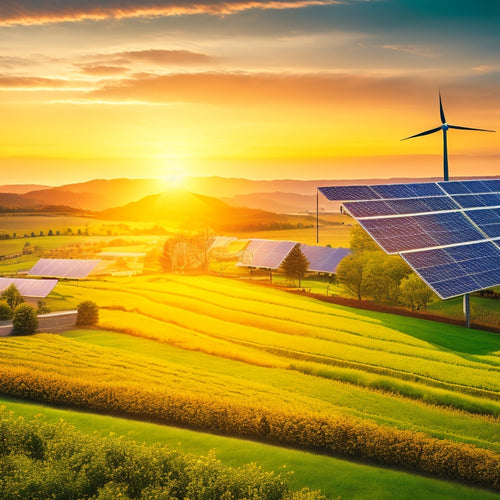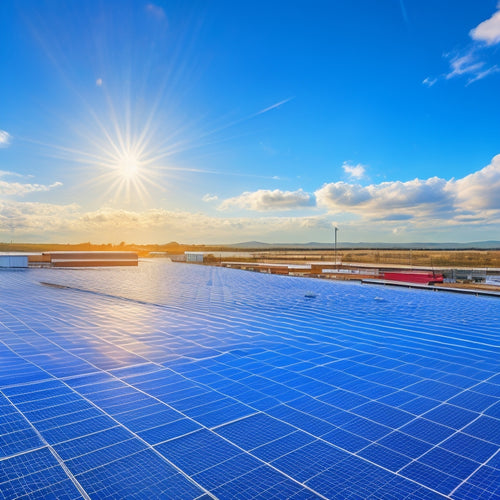
Why Build Your Own Home Energy System?
Share
By building your own home energy system, you can reduce your reliance on the grid by up to 50% and lower your electricity bills by a substantial margin, especially considering that inefficient energy consumption accounts for nearly half of your monthly energy costs. You'll also cut energy waste and lower emissions, promoting sustainability and energy independence. Furthermore, you'll have the opportunity to optimize your system's performance and identify high-energy-consuming appliances. By understanding your energy consumption patterns, you can tailor your system to your specific needs, leading to significant cost savings and a healthier environment. Explore deeper into the benefits of building your own home energy system to uncover how you can reap these rewards.
At a Glance
- Building your own home energy system saves up to 50% on electricity costs by optimizing system performance and incorporating smart thermostats.
- Custom-built systems reduce energy waste and lower emissions by utilizing renewable energy solutions and promoting a healthier environment.
- Inverter technology ensures efficient power conversion, reliable energy flow, and energy independence from the grid.
- Understanding energy consumption patterns helps optimize system design, identify high-energy-consuming appliances, and reduce waste.
- By building your own home energy system, you can achieve energy independence, reduce reliance on fossil fuels, and contribute to a sustainable future.
Save 50% on Electricity
You can cut energy waste and lower your monthly bills by identifying and addressing inefficiencies in your home's energy system.
By optimizing your system's performance, you'll reduce the amount of energy you consume, leading to considerable savings.
By implementing simple changes, such as upgrading to energy-efficient appliances and sealing air leaks, you can save up to 50% on your electricity costs.
Furthermore, investing in a reliable solar panel and battery kit can provide a backup power source during frequent outages and greatly reduce energy bills by utilizing the sun's rays to generate electricity.
Cut Energy Waste
Since energy waste is a significant contributor to high electricity bills, cutting it out is an essential step in building an efficient home energy system. You can achieve this by conducting energy audits to identify areas of inefficiency in your home. This process involves evaluating your energy consumption patterns and identifying opportunities for improvement.
| Inefficient Practices | Efficient Solutions |
|---|---|
| Incandescent lighting | LED bulbs |
| Old appliances | Energy Star certified appliances |
| Poor insulation | Proper insulation and weatherstripping |
| Inefficient HVAC systems | High-efficiency HVAC systems |
Lower Monthly Bills
About half of your monthly electricity bill can be attributed to inefficient energy consumption. This is a staggering amount, especially considering that it's largely avoidable.
By incorporating energy-efficient appliances and smart thermostats home energy management into your daily routine, you can optimize your energy usage and minimize waste. By building your own home energy system, you can greatly reduce your energy waste and lower your monthly bills.
With a well-designed system, you can save up to 50% on your electricity costs, freeing up more money in your budget for the things that matter. This cost savings translates to financial freedom.
Imagine having an extra $100 or more each month to invest, travel, or simply enjoy life. By utilizing renewable energy sources like solar or wind power, you can break free from the grid and reduce your reliance on expensive, polluting energy sources.
With a home energy system, you'll have more control over your energy usage and costs, giving you the freedom to live life on your own terms. By making the switch, you'll not only reduce your energy bills but also contribute to a cleaner, more sustainable future.
Reduced Carbon Footprint Guaranteed
By building your own home energy system, you'll switch to an eco-friendly energy source, greatly reducing your reliance on fossil fuels and lowering your carbon footprint.
Renewable energy solutions, such as photovoltaic systems, can be customized to meet your specific energy needs. This means you'll produce lower emissions today, contributing less to climate change and air pollution.
With a customized system, you'll have complete control over your energy usage, ensuring a cleaner, greener future for generations to come.
Eco-Friendly Energy Source
You're likely considering building your own home energy system because you want to reduce your reliance on fossil fuels and lower your carbon footprint.
By utilizing eco-friendly energy sources, you can greatly decrease your impact on the environment. Renewable resources such as solar, wind, and geothermal energy offer a clean and sustainable alternative to traditional power sources.
When you build your own home energy system, you can incorporate sustainable practices that minimize waste and reduce your carbon footprint. For instance, you can install solar panels that convert sunlight into electricity, or invest in a wind turbine that generates power from wind energy.
These eco-friendly energy sources not only reduce your reliance on fossil fuels but also decrease your energy bills. Additionally, you'll be contributing to a cleaner environment for future generations.
With the right technology and mindset, you can create a self-sustaining energy system that's both environmentally friendly and cost-effective. By making the switch to renewable energy, you'll be taking a major step towards a more sustainable future.
Lower Emissions Today
Lowering emissions today is a critical step in reducing your carbon footprint, and it's guaranteed when you incorporate eco-friendly energy sources into your home energy system.
By shifting to sustainable practices and renewable technologies, you'll greatly decrease your reliance on fossil fuels and lower your carbon emissions. This not only benefits the environment but also contributes to a healthier living space for you and your family.
With a custom-built home energy system, you'll have complete control over your energy production and consumption.
You can optimize your system to maximize energy efficiency, minimize waste, and reduce your carbon footprint. By integrating solar panels, wind turbines, or geothermal energy sources, you'll be generating clean energy and reducing your dependence on the grid.
This means you'll be producing fewer emissions, reducing air pollution, and creating a healthier environment.
Inverter Technology Inside
You'll need an inverter that can efficiently convert DC power from your solar panels or wind turbines to AC power for your home's electrical grid.
To guarantee a seamless shift to backup power during outages, consider an inverter compatible with off grid solar system setups.
Look for an inverter with high conversion efficiency ratings to minimize energy losses and maximize your system's overall performance.
A reliable inverter will guarantee a smooth, consistent energy flow to power your home's appliances and devices.
Efficient Power Conversion
As you investigate the world of home energy systems, utilizing power efficiently becomes a top priority. Efficient power conversion is essential to enhance energy production and minimize losses. This is where inverter technology plays a significant role.
An inverter's primary function is to convert DC power from your solar panels or wind turbines into AC power, which is usable in your home. The key to efficient power conversion lies in the inverter's ability to maximize power efficiency while minimizing energy losses.
To achieve ideal power efficiency, look for inverters with high conversion ratios, typically above 95%. This guarantees that most of the generated energy is converted into usable power, reducing waste and increasing your energy independence.
Additionally, advanced inverters often feature built-in energy optimization algorithms that continuously monitor and adjust the conversion process to guarantee maximum energy yield. By investing in a high-efficiency inverter, you'll be able to enhance your energy production, reduce your reliance on the grid, and enjoy the freedom that comes with generating your own clean energy.
Reliable Energy Flow
Inside your inverter, a complex dance of electronics works in harmony to guarantee a reliable energy flow. This intricate process guarantees that the DC power generated by your solar panels or wind turbines is converted into AC power, perfectly synchronized with the grid's frequency and voltage.
With advanced inverter technology, you can rest assured that your energy independence is secured, free from the whims of the grid.
As you build your own home energy system, you're taking a vital step towards sustainable solutions. By utilizing renewable energy sources, you're reducing your reliance on fossil fuels and minimizing your carbon footprint.
The inverter's reliable energy flow guarantees that your home remains powered, even during grid outages or peak demand hours.
In your pursuit of energy independence, a high-quality inverter is essential. It's the backbone of your system, providing a steady supply of clean energy to power your daily life.
Assess Your Energy Demands
You need to determine your daily energy usage to size your home energy system correctly.
To do this, you'll want to track your energy consumption patterns, including the times of day you use the most energy and the devices that consume the most power. By understanding these patterns, you can design a system that meets your specific energy needs.
As you assess your energy demands, consider renewable energy solutions that can help reduce your reliance on the grid and optimize your energy efficiency.
Additionally, thinking about your energy storage needs, such as a home battery backup, can also play a vital role in your overall energy system design.
Daily Energy Usage
Your daily energy usage is the foundation of a well-designed home energy system. To understand your energy demands, you need to assess your daily energy consumption. This involves tracking your energy usage patterns to identify areas where you can optimize energy efficiency.
Energy monitoring is essential in this process. By installing energy monitoring devices, you can track your energy consumption in real-time, identifying consumption trends and patterns. This information will help you pinpoint appliances and devices that consume the most energy, allowing you to make informed decisions about energy-efficient upgrades or replacements.
For instance, you may find that your HVAC system accounts for a significant portion of your daily energy usage. With this knowledge, you can consider investing in a more energy-efficient system or exploring alternative heating and cooling solutions.
Energy Consumption Patterns
Energy consumption patterns vary greatly from household to household, depending on factors like family size, lifestyle, and climate.
To build an effective home energy system, you need to understand your energy trends and consumption analysis. This involves identifying the times of day when your energy usage is highest and lowest.
Do you notice a spike in energy consumption during the morning when everyone's getting ready for work or school?
Or maybe your energy usage drops notably during the night when everyone's asleep?
Customized Energy Storage Solutions
You've determined your energy demands, now it's time to design a customized energy storage solution that meets your specific needs.
This begins with an energy needs assessment, which involves analyzing your daily energy usage patterns and identifying peak demand periods.
Energy Needs Assessment
By evaluating your energy needs, you'll be able to tailor a customized energy storage solution that meets your specific requirements. This assessment involves calculating your daily energy usage, identifying patterns of consumption, and determining your peak demand periods.
You'll need to take into account factors such as your appliances' energy efficiency, lighting usage, and heating/cooling systems.
Next, you'll want to assess your renewable resource options, such as solar or wind power. How much energy can you generate from these sources? Are there any seasonal variations that might impact your energy output?
By understanding your energy generation capabilities, you can develop a storage strategy that complements your renewable resources.
With this data, you can design a customized energy storage solution that optimizes your energy efficiency and reduces your reliance on the grid. This might involve selecting the right battery type, sizing your storage system, and configuring your charging/discharging cycles.
Frequently Asked Questions
Can I Install a Home Energy System Myself?
You can install a home energy system yourself, but be prepared to handle DIY installation of complex system components, like solar panels, inverters, and batteries, which require technical knowledge and attention to detail.
Are Home Energy Systems Compatible With Old Homes?
You're not limited by your old home's design! With retrofit options, you can seamlessly integrate energy-efficient systems, enhancing your home's performance and slashing energy bills - all while preserving its original charm.
How Long Does It Take to Install a Home Energy System?
When you decide to install a home energy system, you'll spend around 3-6 months on the installation timeline, depending on the complexity of energy system components, such as solar panels, inverters, and batteries, which you'll carefully select and integrate.
Can I Expand My Energy System in the Future?
As you chart your course towards energy independence, you'll find that your system is an energetic anchor, allowing you to set sail for future upgrades and utilizing energy scalability, so you can effortlessly adapt to changing needs and seize new opportunities.
Are Home Energy Systems Resistant to Power Outages?
When you generate your own energy, you're shielded from power outages, ensuring you'll have electricity when you need it. This energy independence also brings cost savings, giving you more control over your life and finances.
Explore More
By building your own home energy system, you'll be saving a small fortune - literally a lifetime's worth of coffee breaks - on electricity bills, with a guaranteed 50% reduction. Plus, you'll be shrinking your carbon footprint to near zero. With state-of-the-art inverter technology and customized energy storage solutions, you'll be the ruler of your energy domain. So, what are you waiting for? Take control of your energy future today!
Related Posts
-

Net Metering in Renewable Energy's Future
Net metering's future is vital for driving renewable energy growth and financial savings. You can reduce your electri...
-

Solar Phone Chargers for Camping Essentials
Solar phone chargers are must-haves for your camping essentials, allowing you to stay connected while enjoying nature...
-

Commercial Solar Energy
As you consider powering your business with commercial solar energy, you'll uncover it offers a triple benefit: signi...


